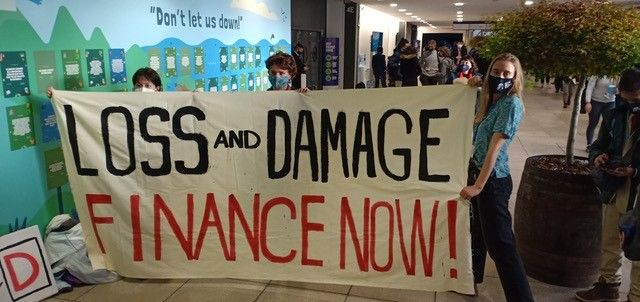Written by Colin McQuistan, Practical Action. Colin is Head of Climate and Resilience in the Influence and Impact team of Practical Action
COP26 in Glasgow was the first global moment that brought negotiators, technical experts, politicians, the private sector and campaigners together since the beginning of the COVID-19 pandemic. Let’s hope that what motivated the phenomenal turn-out in Glasgow (a total of 38,457 delegates) was a clear and urgent acceptance that we need to tackle climate change head-on.
Loss and damage is unquestionably real and accelerating
Whether you analysed the high-level statements, listened to the discussions in the corridors or spoke to the protesters outside, the collective consensus is that our response to climate change is out of kilter with the scale of the emergency. 2021 saw an almost unending sequence of climate breakdown events in the form of droughts, wildfires, tornados, cyclones, floods and heatwaves. The clear evidence of the rapid deterioration of the planet and our shared atmosphere was rarely off the front pages. This recognition of the climate emergency, the rapidity and regularity of climate disaster stories underpins the collective that awareness that Loss and Damage is real and accelerating.
One small and significant achievement during COP26’s first week was the G77 and China negotiating bloc—representing 130 nations, and 85% of the world’s population—coming together to call for the establishment of a Glasgow Finance Facility for Loss and Damage.
Scotland and Wallonia leading by example
Loss and Damage is a highly contested issue in global negotiations, and despite the term being coined in 1991, the concept wasn’t accepted until COP19 in 2013, when the Warsaw International Mechanism for Loss and Damage (WIM) was established. Loss and Damage continues to be a sticking point, and in efforts to unlock the process the Scottish government announced at COP26 that it would provide £1 million for a Loss and Damage fund. This commitment was subsequently increased to £2 million, and catalysed a cascade of similar commitments. The regional government of Wallonia, Belgium offered €1 million, and several philanthropic organisations stepped up to contribute $3 million to the proposed Glasgow Finance Facility for Loss and Damage.
Despite the issue running into the final hours of the negotiations and the exemplary lead by Scotland, Wallonia and the forward-looking philanthropic organisations, the proposal was rejected. Donor governments insisted on a compromise to establish the ‘Glasgow Dialogue’ between conference Parties, relevant organisations and stakeholders to discuss the arrangements for the funding of activities to avert, minimize and address Loss and Damage. This dialogue will take place over the next three years, which means that communities and countries already burdened by climate impacts will have to wait a long time for any finance to flow.

Young activists sharing their message on the importance of finance for loss and damage at COP26. Photo by Colin McQuistan
Those most vulnerable to climate change forced to pay
Loss and Damage is also placing a serious burden on the global financial system. Research by IIED indicates that families in Bangladesh on the frontlines of the climate emergency are spending a staggering 158 billion Taka (almost $2 billion) a year on repairing the damage caused by climate change, and on preventative measures. This is twice the amount the government of Bangladesh spends, and twelve times the amount international donors contribute. If we expect these nations to make the necessary investments in climate mitigation infrastructure, we need to start helping communities adapt to the realities of climate change. This means supporting them for the losses they are already facing.
Sadly, the offer made by the Scottish Government and others to provide finance for Loss and Damage fell on deaf ears. However, it is clear that we need leadership in taking this issue forward, so I hope that the Scottish government follows up on its promise to bring the world together at a Loss and Damage summit to hammer out these issues before COP27.
Find out more on the Flood Resilience Portal here.

